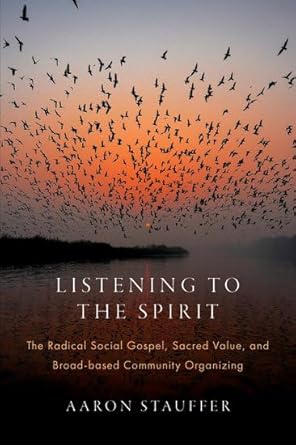
Listening to the Spirit
By
9.26.24 |
Symposium Introduction
Panelists
Daniel P. Rhodes
Emily Dumler-Winckler
Molly Farneth
Richard Wood
David Chi-Ya Choa
Overview
Broad-based community organizing (BBCO) is perhaps the most widely used form of political participation supported by American religious institutions today. As organizing groups become more religiously diverse, however, so do the conceptions of sacred value that ground organizing in the first place. In today’s political climate what we hold most dear, those sacred values such as human life, a land, or a natural resource may seem to only further entrench us in our enclaves and threaten the solidarity of any constituency. This book tells a different story.
People organize to protect and fight for what they hold most dear. Using auto-ethnography from over a decade of interfaith BBCO experiences, Listening to the Spirit makes a case for the political role of sacred values in BBCO, especially as they show up in two organizing practices: the “listening campaign” and the “relational meeting.” Aaron Stauffer argues that by centering sacred values in democratic politics, these organizing practices can be seen as religious practices, and that BBCO can build deeper solidarity through sacred values and relational power. Stauffer offers a social ethical, social practical account of religion and grounds democracy in our diverse religious values.
Listening to the Spirit is a work of Christian social ethics in the tradition of the radical social gospel and draws on discussions of racial capitalism, radical democracy, feminist theory, and philosophical theology. By exploring the political role of sacred values in BBCO, the role of religion in organizing becomes clearer and a new political and ecclesiological terrain opens for Christians to understand these practices in ways Christians have traditionally understood through the Holy Spirit.
Reviews and Endorsements
“Listening to the Spirit is state of the art and cutting edge, making a rich argument that interfaith community organizing works by evoking and creating sacred value, not by marginalizing faith. The pages of this luminous book radiate Aaron Stauffer’s many years of justice organizing and his fusion of social ethics, social theory, political theology, and the burgeoning scholarship on organizing.” — Gary Dorrien, Reinhold Niebuhr Professor of Social Ethics at Union Theological Seminary, Professor of Religion at Columbia University, and author of American Democratic Socialism: History, Politics, Religion, and Theory
“Stauffer gives us not only a powerful and powerfully informed account of community organizing keeping pace with the Spirit, but also a way of thinking about such matters, “sacred value” as crucial instruction on what it means to speak of the Spirit, so that if we dare, we might search out the Spirit’s direct action in the world of liberative politics, and throw in with democracy.” — Jonathan Tran, Associate Dean for Faculty and Associate Professor of Theology at Baylor University, and author of Asian Americans and the Spirit of Racial Capitalism
“With intellectual agility and wisdom born of experience and faith, Stauffer develops a political ecclesiology of organizing based on God’s call to cultivate relationships of liberation and love. He argues that community organizing, at its best, begins with listening for the Spirit’s graceful movement in the world. Through organizing centered in sacred values, churches may build relational power for deepening democracy and countering racial capitalism. Organizers and faithful people seeking a more just world will relish Stauffer’s vibrant continuation of the radical social gospel tradition.” — Cynthia Moe-Lobeda, Professor of Christian Ethics, Pacific Lutheran Theological Seminary and Graduate Theological Union, Director of the Center for Climate Justice and Faith (PLTS), and author of Resisting Structural Evil: Love as Ecological-Economic Vocation
